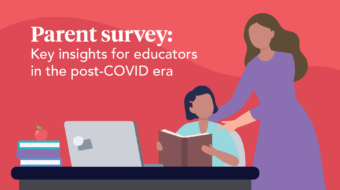
Priorities Address the Growing Crisis for Children with Disabilities
As state legislatures across the country are discussing the future of education and children’s health, PresenceLearning encourages them to act swiftly on new laws and policies that would ameliorate the critical shortage of therapists, clinicians, and much-needed resources for children with disabilities and mental and behavioral health needs. In an official statement for the company, Kelly Wolfe, vice president of strategic partnerships and regulatory compliance, shares PresenceLearning’s 2022 Policy Agenda. She describes how state legislatures can support urgent priorities for children with disabilities and sheds light on why opening up access to special education and related services for all children with needs matters now more than ever.
During the last two years of the pandemic, children experienced greater rates of anxiety, depression, and suicidality as they have been impacted by grief, economic instability, racial disparities, and isolation from friends and social supports. Children with disabilities have seen their challenges compound. According to the National Center for Education Statistics, seven million or 14% of public school students receive special education services. Of children with behavioral and mental health needs, 80% rely on school-based services. When schools shut down, many students were left without the lifelines they so desperately needed and at a time when mental health professionals were already in short supply.
The pandemic has exacerbated what was already a grave situation nationally, with need outpacing the availability of crucial services and special education and mental health resources stretched beyond their budgetary and operational limits. There is a lot that could be done to help alter the terrain and bring much-needed benefits to students and schools alike.
Legislators have an opportunity to address a critical shortage of special education and mental health therapists and clinicians and could immediately help school systems fill an essential need. State licensure and certification requirements can create significant challenges to district and school leaders using teletherapy. In order to provide the services our children with special needs rely on, we must find a way for providers to become licensed and certified in multiple states with far less administrative burden.
Supporting Provider Compact Legislation
State leaders should enact provider compact legislation, such as the Audiology and Speech-Language Pathology Interstate Compact (ASLP-IC), which will help facilitate the interstate practice of audiology and speech-language pathology and improve access to skilled providers while addressing barriers to services and continuity of care while facilitating telehealth as a mode of delivery. They should also ensure that compact legislation includes professionals in the school setting and allows for remote delivery.
Additionally, states should make permanent the COVID-19 waivers that were put in place to facilitate teletherapy and telesupervision requirements. Now is not the time to roll back the progress that was made in expanding access to services and therapies. We encourage elected officials to increase funding for school-linked mental health services and to allow greater use of teletherapy in school systems in order to ensure all children, particularly those in rural and disadvantaged communities, can receive easily accessible support from highly trained clinicians.
One of the most important things we can do to ensure children have what they need to be healthy is to make sure they have access to supportive services and mental health counseling. We can do this through adequate funding, support for school linked health care, and the use of teletherapy. We urge our elected officials to put kids first and pass policies that will help address the needs of our students.
Learn More
To learn more and view PresenceLearning’s 2022 policy agenda, please visit here. For more by Kelly Wolfe read Advocating for Children and How States Can Open up Access to Teletherapy.
Kelly Wolfe is the vice president of strategic partnerships and regulatory compliance for PresenceLearning. She is an external affairs leader with expertise in public policy and government and community affairs. Her long career spans advocacy work at a large children’s hospital; government affairs work, as both a lobbyist and state senate policy advisor; and serving in the classroom as an elementary-school teacher. She is passionate about children’s education and development issues.



